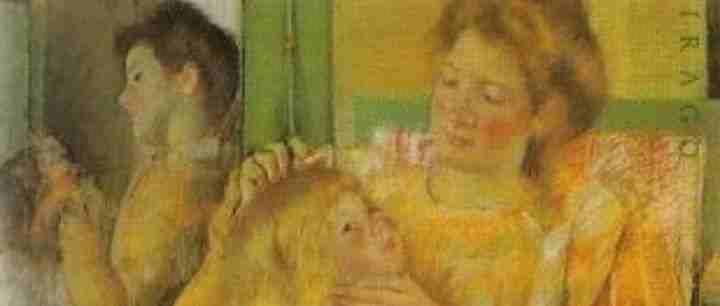精读丨母亲内心的冲突——该如何直面对孩子的「恨」?

课程导读
▸ 母亲的内心对孩子可能怀有怎样的冲突和矛盾感受?
▸ 根据温尼科特,为什么母亲会对自己的孩子有“恨意”?
▸ 为什么比起“完美母亲”,孩子更需要一个“不完美的”真实母亲?
本篇文章分上下两节课讲完,这里辑录了上节前 12 分钟。有兴趣听整节课的朋友,可滑至文末扫码联系小珠珠,领取两张 5 元优惠券购买。
Deep maternal alienation
'Let me give some reasons why a mother hates her baby," wrote the world-famous paediatrician Donald Winnicott in 1947. "The baby is ruthless, treats her as scum, an unpaid servant, a slave ... He is suspicious, refuses her good food, and makes her doubt herself ... "
"My children," wrote the poet Adrienne Rich 20 years later, "cause me the most exquisite suffering of which I have any experience. It is the suffering of ambivalence, the murderousalternation between bitter resentment and raw-edged nerves and blissful gratification."
Couched in deadpan or lyrically anguished language, the suggestion that mothers might hate - yes, hate - their children still has the power to disturb. Lionel Shriver's 2005 Orange-prize-winning novel We Need To Talk About Kevin turned on this unacceptable idea of deep maternal alienation, and its potential to provoke societal mayhem.
来源:The Guardian
参考译文
母亲的深度孤立
享誉全球的儿科医生唐纳德·温尼科特在 1947 年中写道:“让我来解释一下为什么一位母亲会恨自己的婴儿。”“婴儿残忍无情,把她当作一个下等人,一个无报酬的仆人,一个奴隶... TA 多疑,拒绝她给的好食物,让她怀疑自己......”
20 年后,诗人艾德里安娜·里奇写道:“我的孩子们给我带来了我所经历过的最深的痛苦。这是一种矛盾心理的折磨,是苦毒的怨恨、敏感的神经和幸福的满足之间的痛苦交替。”
这段冷峻或者说以痛苦的语言书写成的文字所传达出的信息,至今仍然有着震撼人心的力量,那就是母亲可能会恨,没错,是恨她们的孩子。莱昂内尔·施莱弗在她 2005 年获得橘子文学奖的小说《我们需要谈谈凯文》中,探讨了母亲深度孤立这个令人难以接受的话题,以及它造成社会性灾难的可能性。
重点词汇
alienation /ˌeɪliəˈneɪʃ(ə)n/ n. 疏离感
○ the feeling of not being part of society or a group
○ e.g. Unemployment may provoke a sense of alienation from society. 失业可能会引起不容于社会的感觉。
paediatrician /ˌpiːdiəˈtrɪʃn/ n. 小儿科医生,小儿科专家
○ a doctor who has special training in medical care for children
ruthless /ˈruːθləs/ adj. 无情的,冷酷的,残忍的
○ not thinking or worrying about any pain caused to others; cruel
○ e.g. ruthless ambition 冷酷无情的野心
○ e.g. a ruthless dictator 残忍的独裁者
scum /skʌm/ n. 人渣,败类
○ a very bad or immoral person or group of people
○ e.g. Don't waste your sympathy on scum like that. 对这样的渣滓你没必要同情。
exquisite /ɪkˈskwɪzɪt/ adj. 剧烈的,极度的
○ Exquisite is used to emphasize that a feeling or quality is very great or intense.
○ e.g. exquisite pain/pleasure 剧烈的疼痛/极大的快乐
ambivalence /æmˈbɪvələns/ n. 矛盾情绪,双重人格,对人、对物或对观点的相对立态度或感情的共存,如爱和恨
○ The coexistence of opposing attitudes or feelings, such as love and hate, toward a person, an object, or an idea.
○ e.g. Many people feel some ambivalence towards television and its effect on our lives. 很多人以矛盾的态度对待电视及其对生活的影响。
murderous /ˈmɜːdərəs/ adj. 令人非常难受的
○ extremely unpleasant
○ e.g. The traffic was murderous today. 今天的交通堵得要命。
alternation /ˌɔːltəˈneɪʃn/ n. 交替,从一种事物或状态变为另一种事物或状态并再变回来的一系列变化
○ successive change from one thing or state to another and back again
○ e.g. The alternation of sun and snow continued for the rest of our holiday. 我们剩余的假期里依旧时而晴天时而下雪。
raw edge /rɔː edʒ/ n.(板、带材的)裂边,毛边
○ the edge of a piece of material before it has been sewn
blissful /ˈblɪsfl/ adj. 极乐的,极幸福的
○ extremely or completely happy
○ e.g. a blissful childhood/holiday 快乐的童年/假日
couch /kaʊtʃ/ v.(用特定风格的语言)表达(某事)
○ (be couched in sth.) to express (something) in language of a specified style
○ e.g. The letter was deliberately couched in very vague terms. 这封信故意写得含糊其词。
deadpan /ˈdedpæn/ adj. 故作严肃的,冷面滑稽的
○ sounding and looking completely serious when you are saying or doing something funny
○ e.g. deadpan humour 冷面幽默
anguished /ˈæŋɡwɪʃt/ adj. 痛苦不堪的
○ Anguished means showing or feeling great mental suffering or physical pain.
○ e.g. anguished cries 痛苦不堪的喊声
mayhem /ˈmeɪhem/ n. 混乱状态
○ a situation in which there is little or no order or control
○ e.g. There was absolute mayhem when everyone tried to get out at once. 众人蜂拥而出,造成了极大的混乱。
本期内容节选自虎课外刊精读2023/05/12课程:
Karen丨母亲内心的冲突——该如何直面对孩子的「恨」?1/2
讲师介绍
扫描下方课程二维码
购买本节完整音频+配套PDF讲义
包含完整外刊原文/参考译文/重点词汇/背景拓展/习题测试等
2023 VIP 和年卡用户可以免费收听~
原价 19.9 元,添加客服小珠珠⇩⇩⇩ 领取 5 元优惠券
扫码 ⇧ 订购 2023 虎课外刊精读
推荐阅读
最新评论
推荐文章
作者最新文章
你可能感兴趣的文章
Copyright Disclaimer: The copyright of contents (including texts, images, videos and audios) posted above belong to the User who shared or the third-party website which the User shared from. If you found your copyright have been infringed, please send a DMCA takedown notice to [email protected]. For more detail of the source, please click on the button "Read Original Post" below. For other communications, please send to [email protected].
版权声明:以上内容为用户推荐收藏至CareerEngine平台,其内容(含文字、图片、视频、音频等)及知识版权均属用户或用户转发自的第三方网站,如涉嫌侵权,请通知[email protected]进行信息删除。如需查看信息来源,请点击“查看原文”。如需洽谈其它事宜,请联系[email protected]。
版权声明:以上内容为用户推荐收藏至CareerEngine平台,其内容(含文字、图片、视频、音频等)及知识版权均属用户或用户转发自的第三方网站,如涉嫌侵权,请通知[email protected]进行信息删除。如需查看信息来源,请点击“查看原文”。如需洽谈其它事宜,请联系[email protected]。